About
It’s a maritime miracle that the Elissa, a 19th-century tall ship, exists today—let alone continues to sail the open seas. Very few traditionally rigged sailing vessels have made it to modern times. In fact, Elissa is one of only three tall ships in the world that’s still active.
Moored at the Texas Seaport Museum in Galveston, Texas, the Elissa offers a fascinating glimpse into the Age of Sail, a period in European history when sailing ships ruled the waters. Launched in 1877, the three-masted, square-rigged iron barque is one of the world's oldest operational vessels. When not being boarded by visitors as a floating museum, the boat is being maintained and rigged by a volunteer group of local sailing hobbyists.
Elissa was built in Aberdeen, Scotland, during a shifting period of change for maritime technology. As steamships were becoming increasingly favored for their reliable direction and speed, the vessel was one of the last of its kind, a hybrid of old and new. Though a traditionally built ship made of wood, wire, and rope machinery, its innovative upgrades, such as an iron hull (rather than wood) and towering mast towers 99 feet above deck, are truly remarkable.
Named after the legendary queen of Carthage, who fled tyranny in Tyre and founded her own city (modern-day Tunis), the Elissa has traveled far and wide. She has called ports around the world and under various sovereignties. Initially built as a British cargo ship, Elissa traveled to the Caribbean and the Gulf of Mexico, before traveling under Norway, Sweden, and Finland’s flags in 1930, then Greece in 1959. She retired to a Piraeus salvage yard by 1970.
Galveston Historical Foundation purchased the Elissa for $40,000, rescuing her from disrepair in 1975. Back in the day, Elissa had called port on two notable occasions in Galveston: Once in 1883, trading a load of bananas for cotton (then Galveston's top export) and again sailing through an 1886 hurricane which significantly destroyed the port.
Today, Elissa welcomes over 40,000 visitors annually to the Texas Seaport Museum. The museum focuses on Galveston’s history as the so-called ‘Ellis Island of the West’ – a busy port welcoming more than 133,000 turn-of-the-century immigrants. Though Elissa’s journey may have started elsewhere, Galveston’s main dock is a fitting final stop for a sailing beauty with a colorful history.
Related Tags
Know Before You Go
While the sailing vessel is maintained year-round by local volunteers, anyone can take part in a training course and set sail for up to six hours on during the annual Day Sails.
Community Contributors
Added By
Published
September 10, 2024
Sources
- https://www.galvestonhistory.org/sites/1877-tall-ship-elissa-at-the-galveston-historic-seaport
- https://www.visitgalveston.com/blog/tall-ship-elissa-podcast/
- https://texastimetravel.com/directory/texas-seaport-museum-tall-ship-elissa/
- https://en.wikipedia.org/wiki/Elissa_(ship)
- https://www.galvestonhistory.org/events/elissa-daysails





















